Related Research Articles
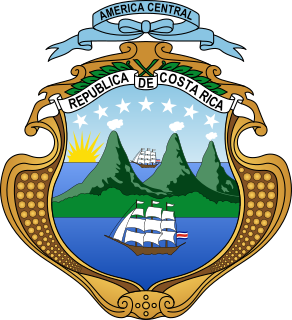
The politics of Costa Rica take place in a framework of a presidential, representative democratic republic, with a multi-party system. Executive power is exercised by the president and their cabinet, and the President of Costa Rica is both the head of state and head of government. Legislative power is vested in the Legislative Assembly. The president and 57 Legislative Assembly deputies are elected for four-year terms. The judiciary operates independent of the executive and the legislature but remains involved in the political process. Costa Rica is a republic with a strong system of constitutional checks and balances. Voting is compulsory in Costa Rica but it is not enforced.

The Social Christian Unity Party is a centre-right political party in Costa Rica.

The Costa Rican Civil War was the bloodiest event in 20th-century Costa Rican history. It lasted for 44 days, during which approximately 2,000 people are believed to have died. On 1 March 1948, the Legislative Assembly of Costa Rica, dominated by pro-government representatives, voted to annul the results of the presidential elections of 8 February, alleging that the triumph of opposition candidate Otilio Ulate over the ruling party's Rafael Ángel Calderón Guardia had been achieved by fraud. This triggered an armed uprising led by José Figueres Ferrer, a businessman who had not participated in the elections, against the government of President Teodoro Picado.
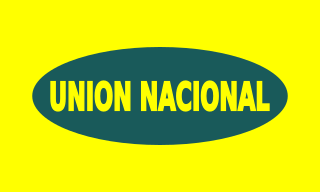
The National Union Party is the name of several parties in Costa Rica, generally located on the centre-right of the political spectrum.
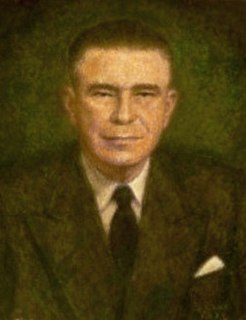
General elections were held in Costa Rica on 8 February 1948. Otilio Ulate Blanco of the National Union Party won the presidential election with 55.3% of the vote, although the elections were deemed fraudulent and annulled by Congress, leading to the Costa Rican Civil War later that year. Following the war, the results of the parliamentary election were also annulled. Voter turnout was 43.8% in the vice-presidential election and 49.2%.
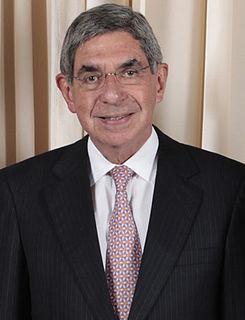
General elections were held in Costa Rica on 2 February 1986. Óscar Arias of the National Liberation Party won the presidential election, whilst his party also won the parliamentary election. Voter turnout was 81.8%.

The Constitution of Costa Rica is the supreme law of Costa Rica. At the end of the 1948 Costa Rican Civil War, José Figueres Ferrer oversaw the Costa Rican Constitutional Assembly, which drafted the document. It was approved on 1949 November 7. Several older constitutions had been in effect starting from 1812, with the most recent former constitution ratified in 1871. The Costa Rican Constitution is remarkable in that in its Article 12 abolished the Costa Rican military, making it the second nation after Japan to do so by law. Another unusual clause is an amendment asserting the right to live in a healthy natural environment.

Costa Rica’s National Constituent Assembly was formed after the 1948 civil war. Elections to the Assembly for a New Constitution were called on December 8, 1948 by the then de facto Junta provisional government presided by José Figueres. The Assembly took place between January 15 and November 7, 1949. The Assembly successfully drafted and approved the current Costa Rican Constitution.

The Social Christian Republican Party is a Costa Rican political party founded in 2014 by former president Rafael Ángel Calderón Fournier and his group of supporters as a splinter from the historical Social Christian Unity Party (PUSC). The party also uses the colors and a similar name of Calderón's father's party, the National Republican Party.
Costa Rican nationalism is the nationalist vision of the cultural and national identity of Costa Rica. According to scholars such as Tatiana Lobo, Carmen Murillo and Giovanna Giglioli, Costa Rican nationalism is based on two main myths; rural democracy since colonial times and the racial (white) "purity" of the Central Valley as the cradle of Costa Rican society.
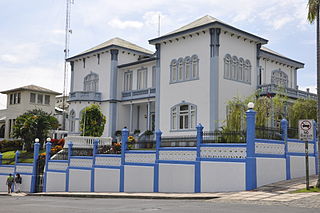
The 1917 Costa Rican coup d'état of 27 January 1917 was a rupture of the constitutional order in the Republic of Costa Rica, where the constitutional President Alfredo González Flores, was overthrown by his Minister of War and Navy Federico "Pelico" Tinoco and his brother and army commander José Joaquín Tinoco. The coup had the support of the Costa Rican oligarchy —mainly the bankers and coffee growers— affected by González's tax reform, particularly a greater tax burden for the big capital. Gonzalez did not enjoyed popular support as he had been appointed by Congress and not elected in open elections.

Liberalism in Costa Rica is a political philosophy with a long and complex history. Liberals were the hegemonic political group for most of Costa Rica's history especially during the periods of the Free State and the First Republic, however, as the liberal model exhausted itself and new more left-wing reformist movements clashed during the Costa Rican Civil War liberalism was relegated to a secondary role after the Second Costa Rican Republic with the development of Costa Rica's Welfare State and its two-party system controlled by social-democratic and Christian democratic parties.

The history of the Costa Rican legislature is long and starts from even before its formal independence from the Spanish Empire. Costa Rica is one of the world's oldest democracies, thus, its parliamentary history dates back several centuries.

The Reform State or Reformist State is a period in Costa Rican history characterized by the change in political and economic paradigm switching from the uncontrolled capitalism and laissez faire of the Liberal State into a more economically progressive Welfare State. The period ranges from approximately 1940 starting with the presidency of social reformer Rafael Angel Calderón Guardia and ends around the 1980s with the first neoliberal and Washington Consensus reforms that began after the government of Luis Alberto Monge.

The Constitutional Congress of Costa Rica was the unicameral parliament of the country for most of its history. It was established in the Political Constitution of 1871. It consisted of 43 deputies and 18 alternates elected proportionally by provinces at the rate of one deputy for every 15,000 inhabitants with, among other powers, being able to choose the President in case none of the candidates obtained the minimum required to be elected, as happened in the 1913 election, the first election that were held with direct popular vote, and in which none of the candidates; Máximo Fernández Alvarado, Carlos Durán Cartín and Rafael Yglesias Castro, gathered enough votes to win in the first round. It was therefore the responsibility of the Congress to choose the president from among the candidates, but all of them withdrew their name and Alfredo González Flores was chosen.

The Founding Junta of the Second Republic was a de facto government which existed in the Republic of Costa Rica from May 8, 1948 to November 8, 1949, with the overthrow of the constitutional president Teodoro Picado Michalski, by a group Of the revolutionaries headed by José Figueres Ferrer.
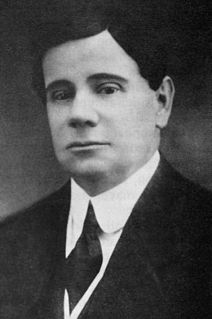
The dictatorship of the Tinoco Brothers, also Tinochist or Peliquist Dictatorship, or Tinoco regime is the period of Costa Rica in which the military dictatorship led by Federico Tinoco Granados as de facto president and his brother José Joaquín Tinoco Granados as Minister of War was in place. It began after the 1917 Costa Rican coup d'état on January 27, 1917 and culminated with the departure of Tinoco from Costa Rica to France on August 13, 1919 three days after the murder of his brother and after a series of armed insurrections and massive civil protests known as the Sapoá Revolution and the 1919 student civic movement.

Calderonism or Calderonismo is a political and ideological doctrine of Costa Rica, which emerged in the 1940s under the leadership of caudillo Dr. Rafael Ángel Calderón Guardia, before, during and after he was president with his National Republican Party, and which was continued by various political forces such as Unity Coalition, National Unification Party and the current Social Christian Unity Party and its split the Social Christian Republican Party. It is together with Liberacionismo one of the two traditional political tendencies of Costa Rican politics, with which it represented a certain type of Costa Rican bipartisanship from 1986 to 2002 and revolves around the Calderón family. It is a form of populist and Catholic Christian socialism very similar to Argentine Peronism.

The Revolutionary Civic Union was the name of an armed paramilitary group and later far-right Costa Rican political party. The party was led by politician Frank Marshall Jiménez, denoted anti-communist and anti-Calderonista, who became a member of the Legislative Assembly.
References
- 1 2 3 4 Mahoney, James (June 2001). The Legacies of Liberalism: Path Dependence and Political Regimes in Central America. Johns Hopkins. ISBN 9780801865527 . Retrieved 2 July 2017.
- 1 2 3 Nohlen, D (2005) Elections in the Americas: A data handbook, Volume I, p155 ISBN 978-0-19-928357-6